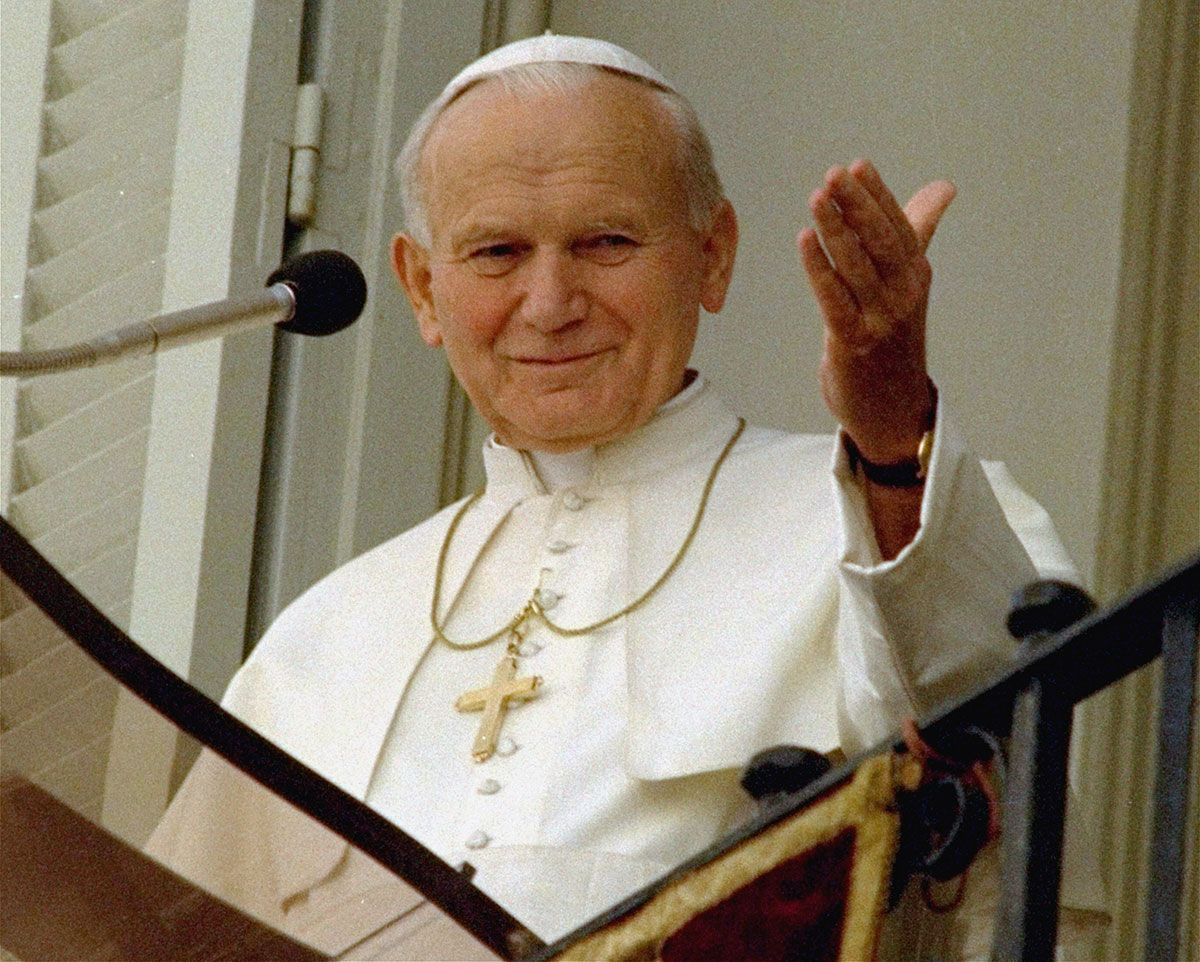John Paul II, born Karol Józef Wojtyła, remains one of the most influential figures of the 20th century and a pivotal leader in the history of the Catholic Church. Serving as Pope from 1978 to 2005, his pontificate was marked by extensive global travel, a profound impact on international politics, and a deep commitment to promoting human dignity. His life and work continue to resonate with people of all faiths around the world.
 Pope John Paul II waving to pilgrims, September 10, 1989
Pope John Paul II waving to pilgrims, September 10, 1989
Early Life and Formative Influences of Karol Wojtyła
Karol Wojtyła’s early life in Wadowice, Poland, was shaped by a confluence of personal and historical events. Born on May 18, 1920, his childhood coincided with Poland’s brief period of independence between the World Wars. This experience instilled in him a deep appreciation for national freedom and an awareness of its fragility. Wadowice, a diverse town with both Catholic and Jewish communities, fostered in young Karol an early understanding of interfaith relations, despite its proximity to the future Auschwitz concentration camp.
His family life, though marked by early loss – his mother Emilia Kaczorowska died when he was just eight, followed by his brother Edmund a few years later – provided a strong foundation. His father, Karol Wojtyła Sr., a Polish Army lieutenant, instilled in him discipline and a devout Catholic faith. Karol excelled in school, developed a passion for theater and sports, and actively participated in church life, serving as an altar boy and becoming deeply influenced by his confessor, Father Kazimierz Figlewicz.
In 1938, Wojtyła moved to Kraków to study at the Jagiellonian University, immersing himself in literature and philosophy. However, his academic pursuits were abruptly interrupted by the Nazi invasion of Poland in 1939. Under Nazi occupation, universities were closed, and Poles faced persecution. Wojtyła, along with many others, engaged in clandestine studies and worked to avoid deportation. He labored in a quarry and then a chemical factory, experiences that made him the only modern Pope to have worked as a manual laborer. This period of hardship and resistance deepened his understanding of suffering and strengthened his resolve. He also became involved with the underground Rhapsodic Theatre, using culture to sustain Polish morale, and was introduced to the mystical teachings of St. John of the Cross by Jan Tyranowski, further solidifying his spiritual path.
The Calling to Priesthood and Seminary Years
The profound loss of his father in 1941 served as a turning point, solidifying Wojtyła’s decision to dedicate his life to the priesthood. By 1942, he had begun studying in secret for the priesthood in an underground seminary run by Cardinal Archbishop Adam Sapieha of Kraków. This clandestine education took place under constant threat from the Nazi regime. He narrowly avoided capture by the Nazis in 1944 and spent the remainder of the war hidden in the Archbishop’s Palace. Witnessing the brutality of the Nazi occupation and the persecution of priests profoundly shaped his understanding of the priesthood as a vocation of service and sacrifice.
After the war, with the Soviet Union’s influence rising in Poland, Wojtyła continued his seminary studies. He was ordained a priest in November 1946 by Cardinal Sapieha. His first Mass, celebrated in the crypt of Wawel Cathedral, a place of national significance, symbolized his deep connection to Polish history and faith. Following ordination, he pursued further theological studies in Rome, earning a doctorate focusing on St. John of the Cross. Upon returning to Poland in 1949, he served as a parish priest in Kraków while continuing to teach and write on ethics and theology. He earned a second doctorate and became a professor at both the Jagiellonian University and the Catholic University of Lublin, becoming a respected academic and spiritual leader. During this time, he anonymously published poetry and led a group of young adults, fostering their spiritual growth through outdoor retreats and discussions, even in the face of communist restrictions on religious expression. His experiences and reflections during these years culminated in his influential book, Love and Responsibility, which offered a progressive view of sexuality within marriage.
From Archbishop to the Vatican: Preparing for Papacy
Wojtyła’s pastoral effectiveness and intellectual depth garnered attention within the Church hierarchy. In 1958, Pope Pius XII appointed him Auxiliary Bishop of Kraków. His participation in the Second Vatican Council (1962-1965) proved transformative, exposing him to a global Church perspective and crucial modernizing reforms. He actively contributed to discussions on the role of laity, interfaith dialogue, and the Church’s engagement with the modern world. Midway through the Council, in 1963, Pope Paul VI elevated him to Archbishop of Kraków.
Following Vatican II, Archbishop Wojtyła was appointed to Pope Paul VI’s commission on family, population, and birth rate issues. His conservative views significantly influenced the encyclical Humanae Vitae (1968), which upheld the Church’s traditional stance against artificial contraception, a document that proved controversial and widely debated within and outside the Catholic Church. Despite this, Wojtyła’s influence and standing within the Church continued to rise, setting the stage for his unexpected ascension to the papacy.
The Pontificate of John Paul II: A Global Papacy
In October 1978, Karol Wojtyła was elected Pope, taking the name John Paul II. This election marked a historic moment: he was the first non-Italian Pope in 455 years and the first ever from a Slavic nation. His Polish heritage and experience living under both Nazi and communist regimes profoundly shaped his papacy.
John Paul II’s pontificate was characterized by an unprecedented level of global engagement. He embarked on numerous international trips, visiting more countries than all his predecessors combined. These journeys were not merely ceremonial; they were opportunities to engage with diverse cultures, promote peace, and advocate for human rights. He used his global platform to speak out against political oppression, particularly in communist countries, and to challenge materialism in the West.
His unwavering support for the Solidarity movement in Poland played a crucial role in the eventual collapse of communism in Eastern Europe. His message of hope and freedom resonated deeply with people living under oppressive regimes. John Paul II understood the power of faith and nonviolent activism in bringing about political change. His meetings with world leaders, including those of Poland and the Soviet Union, are believed to have contributed significantly to the peaceful dismantling of the Soviet bloc.
Beyond political activism, John Paul II was a tireless advocate for interfaith dialogue. He made groundbreaking efforts to reconcile with Judaism and Islam, issuing apologies for historical wrongs committed by Catholics. He fostered relationships with leaders of other faiths, promoting mutual understanding and cooperation. He also oversaw the publication of a new Catechism of the Catholic Church in 1992, updating and clarifying Catholic doctrine for the modern era. During his papacy, he canonized nearly 500 saints, more than all of his predecessors in the preceding centuries, highlighting diverse examples of holiness within the Church.
However, John Paul II’s papacy was not without its critics. His centralized leadership style was seen by some as autocratic, stifling local church initiatives. His staunchly conservative stance on issues of sexual morality, including contraception and the role of women in the Church, alienated some segments of the laity. Despite his efforts, the Church continued to face challenges, including a decline in the number of priests and nuns in many parts of the world.
Legacy and Sainthood of Pope John Paul II
Despite the challenges and criticisms, John Paul II’s legacy is undeniable. He is widely recognized as a transformative figure who reshaped the papacy and the Catholic Church’s role in the world. He modernized the papacy, making it more globally visible and politically engaged. His emphasis on human dignity, religious freedom, and nonviolent resistance had a profound impact on the late 20th century.
John Paul II died on April 2, 2005, and was beatified on May 1, 2011, and canonized as a saint on April 27, 2014. Saint John Paul II is remembered for his charisma, his intellectual rigor, his deep spirituality, and his unwavering commitment to his faith and to humanity. His life story, from his early years in Poland to his global papacy, serves as an inspiration to millions around the world, and his teachings continue to influence the Catholic Church and global discourse on faith, freedom, and human dignity.

